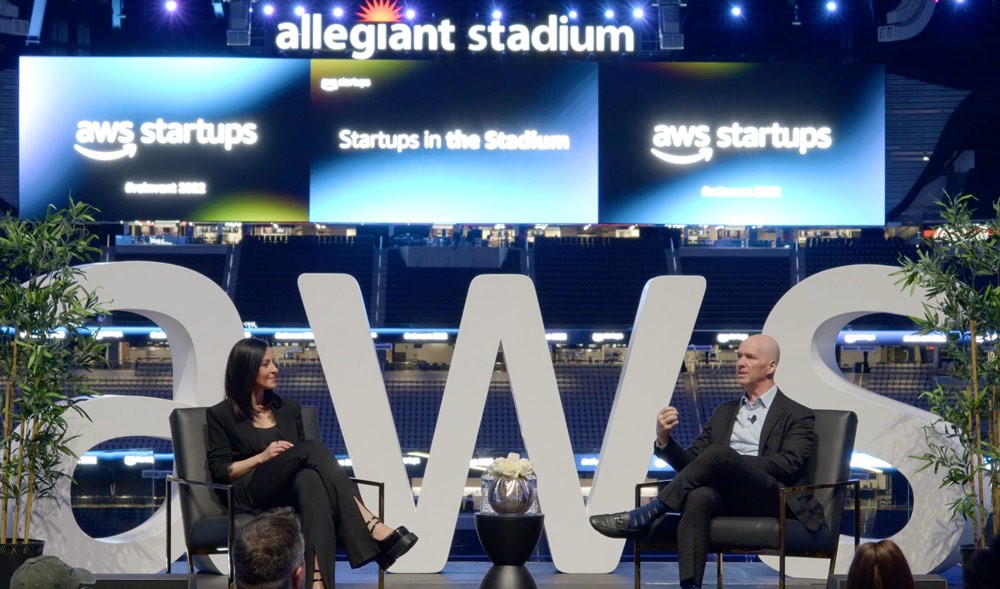このコンテンツはいかがでしたか?
Andreessen Horowitz の共同創設者である Ben Horowitz 氏、クラウドを活用し、経済的混乱を乗り越え、永続的な関係を築く
Ben Horowitz 氏のようにテクノロジー分野の変革を見た人はほとんどいません。Andressen Horowitz (a16z) の共同創設者であり起業家であり、ニューヨークタイムズ紙のベストセラー作家でもある彼は、何十年にもわたってイノベーションの促進と強固なビジネス関係の構築に取り組んできました。彼から共有できる知恵はたくさんあります。
Horowitz 氏は、昨年 12 月に re: Invent で開催された AWS「Startups in the Stadium」イベントで、Amazon Web Services (AWS) のワールドワイドチャネルおよびアライアンスバイスプレジデントである Ruba Borno と対話しました。ここでは、信頼、ベンチャーキャピタル、クラウドの影響などについて、彼らの議論から得た 6 つの主要な知見を紹介します。

創設者に力を与える今日のベンチャーキャピタル業界
2009 年に a16z が設立されて以来、Horowitz 氏はベンチャーキャピタル (VC) 業界を形作るいくつかの大きな変化を目の当たりにし、その先頭に立ってきました。一例を挙げると、今日では、創設者は「0 から 1」を率いて、その後はプロの最高経営責任者 (CEO) に役割を譲るのではなく、成長のあらゆる段階で事業を率いる可能性が高くなっていると彼は説明した。
その変化は、a16z が VC の世界にもたらした哲学に一部起因しています。「私たちのアイデアは...創設者が CEO になれるような会社を作ったらどうなるかということでした」と Horowitz 氏は説明します。結局のところ、会社を真に理解しているリーダーは、成功につながる別のプロジェクト、たとえば二次製品を通じてビジネスを導くことができるのです。
彼はアマゾン ウェブ サービス自体を例として挙げました。「これはずっと後に行われた別の (プロジェクト) です。そして、Jeff (Bezos) が CEO でなければ、このようにはならなかったと誰もが知っています。会社のことをよく理解していない人を連れてきて、0 から 1 にすることはできません」
現金は王様 (今までも、これからも)
世界の多くの地域が経済の不確実性に直面する中、Horowitz 氏はスタートアップに対し、彼がビジネスにおける「許されない罪」と見なしていること、つまり現金不足に陥らないように警告しました。景気後退期には、これは特に困難になります。なぜなら、消費者は実績のある有力企業よりも新しい企業を予算から切り離す傾向があるからです。
それでも、Horowitz 氏は、それは引き続き優先事項であるべきだと言いました。「製品、市場投入、すべてを台無しにしてしまう可能性があります。しかし、まだお金が残っていれば、それを修正できます。お金がなくなったとしたら、どれだけ良いことをしてもかまいません関係ありません。もう死んでしまっています」
クラウドはイノベーションを促進する
a16z のポートフォリオ企業の多くは AWS をベースに構築しています。Horowitz 氏は、AWS を日常業務の拡張、革新、合理化の手段と見なしています。
「クラウドデプロイモデルは、あらゆる人の、優れたソフトウェアを構築し、重要な問題を解決し、より高いレベルの問題に集中する能力を飛躍的に向上させます」と同氏は言います。
彼は、Navigator ブラウザを物理的な箱入り製品として販売していた Netscape のような過去のテクノロジー企業と、「4 人、ラップトップ、AWS、ブーム」だけで製品を作成して配布した Snap のような新しい企業との違いを指摘しました。
「AWS は大きな変化でした。だからこそ、今はスタートアップがこんなにも増えたのです」と彼は言います。
イノベーションを促進するだけでなく、AWS は内部プロセスの円滑化にも役立つと同氏は言います。昔ながらのソフトウェアはインストールや実装が難しく、さらに、新しいソフトウェア (およびアップデート) についてチームをトレーニングするのも骨の折れる作業でした。Horowitz 氏は、新しいソフトウェアの統合は非常に難しく、企業の最高情報責任者 (CIO) が営業の窓口になっていたと説明しました。しかし、クラウドの登場により、はるかに簡単になり、ソフトウェア企業は実際のビジネスニーズがある部門に販売できるようになりました。
「トレーニングは必要ない。このソフトウェアは十分に使用でき、どこでも使えます」と Horowitz 氏は言います。
AWS で成功する 3 つの方法
Horowitz 氏は、AWS との連携に関心のある企業に 3 つのアドバイスをしました。
まず、AWS Marketplaceに参入することが不可欠だと彼は言いました。「うまくいきます。売り上げは上がるし、助けになります」と彼は言いました。
次に、営業チームを AWS 営業と連携させることの重要性を強調しました。「地域の営業担当者は、支援を希望する AWS 営業担当者を見つける必要があります。彼らを探し、電話をかけてください。これはおそらくあなたにとって最高のリードジェネレーションの機会です」
最後に、彼はすべての企業に AWS の技術審査プロセスを経ることを推奨しています。「それを検討すべき理由は、AWS 分野に携わっているなら、このソフトウェアが良いかどうかをどのように知るのかということです」と彼は言います。調べる方法は、AWS のような信頼できる第三者からの承認を受けることです。
パートナーシップ内での信頼の構築
Horowitz 氏は、組織の文化、信頼、コミュニケーションを大切にしていることを伝えました。ここでは、a16z がパートナーシップを通じて信頼を築く 3 つの方法を紹介します。
まず、彼はこう言いました。「お互いをどう扱うか、(組織の) 外の人々をどう扱うかについて、私たちは一つの文化を持っています。それは変えません。私たちと彼らではないのです」
次に、彼、そして彼のチームの言葉は、結びつきです。「私たちと契約を結ぶ必要はありません。言ったことは、実行するのです。私たちは従業員に、自分の言うことには注意するように言っています。会社を縛ることになるからです」(実際、a16z の従業員はこれを理解していることを確認する文書に署名しなければなりません)
最後に、彼は取引的な関係を信じていないことを強調しました。「私たちはお付き合いのビジネスに携わっているので、関係については長い目で見ています。あなたと長くお付き合いするか、しないかのどちらかです」と彼は説明しました。
自分が望む未来をつくる
Horowitz 氏はキャリアを通じてさまざまな役割を果たしてきました。Borno が言うように、彼は「プロダクトマネージャー、HP の GM 担当スタートアップの最高経営責任者、そして...世界で最も成功しているベンチャーキャピタルの創設者」です。
Horowitz 氏は、自分自身を改革したいという思いからではなく、ステップアップして必要なことをする意欲からこの道を歩んだと考えています。彼は、プロダクトマネージャーとして働いていた Netscape の初期の頃、後にパートナー (そして Netscape の共同創設者) となる Marc Andreessen 氏が、初期のインターネットを強化するための措置を講じなければ、他の誰かがその仕事を引き受ける保証はないと指摘したことを思い出しました。そしてその積極性が実を結び、SSL や JavaScript などの導入に貢献したのです。
Horowitz 氏はその後の取り組みでも「常に顧客への良い影響が最優先」という姿勢を貫いています。
「ステップアップして何をすればいいのか。違いを生むために何ができるのか」と Horowitz 氏は言いました。
インタビューの全文はこちらをご覧ください。

Megan Dubinsky
Megan Dubinsky は、AWS でスタートアップのお客様と連携する Senior Field Marketing Manager です。スタートアップのお客様が学び、成長して、適切なリソースを利用できるようサポートすることに情熱を注いでいます。AWS に入社する前は、ヘルスケアとヘルステクノロジーの分野で、マーケティングと製品管理の役割を担っていました。夏の間だけシカゴに住み、チョコチップクッキーと同じくらいランニングを楽しんでいます。
このコンテンツはいかがでしたか?